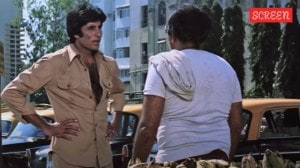Bombay HC sets aside Maha Govt’s decision to prohibit levying of convenience fees on online movie tickets
BookMyShow argued that service providers such as IRCTC, MakeMyTrip, etc, are not subject to any restrictions; therefore, the Maharashtra Government GOs were discriminatory.
 The Bombay High Court had extended its interim order of May 26, awaiting the Delhi High Court verdict, noting that final permanent replacement of the petitioner would lead to “irreparable injury” till then. (File)
The Bombay High Court had extended its interim order of May 26, awaiting the Delhi High Court verdict, noting that final permanent replacement of the petitioner would lead to “irreparable injury” till then. (File)The Bombay High Court Thursday quashed and set aside the Maharashtra Government’s decision that prohibited cinema theatre owners, exhibitors, and agents from charging additional amounts from viewers as service charges or convenience fees on movie tickets booked through online platforms.
The high court said the decisions of the Revenue Department were violative of the fundamental right of carrying out business, and that the authorities did not have the power to issue the same under the Maharashtra Entertainment Duty (MED) Act.
On July 9, 2014, the HC had stayed the operation and implementation of portions of the impugned government orders (GOs), which continued from time to time, keeping the decision in abeyance for over a decade.
A division bench of Justices Mahesh S Sonak and Jitendra Jain on July 10 passed a judgement on pleas by PVR Limited, FICCI-Multiplex Association of India, and Big Tree Entertainment Private Limited, which operates the online ticketing platform, BookMyShow, that challenged portions of two GOs of 2013 and 2014.
Through a GO in April 2013, the Maharashtra Government had prohibited operators, owners, and agents from levying any additional service charge on viewers. The March 2014 GO provided that theatre conductors across the state should set up their own service or machinery for online ticket sales and no additional service charges should be recovered from viewers for the same.
Advocate Naresh Thacker, for PVR and FICCI-Multiplex Association, argued that convenience fees charged for online booking platforms were a separate component agreed between private parties, and it was not under the purview of the MED Act.
BookMyShow, through advocate Rohan Rajadhyaksha, argued that service providers such as IRCTC, MakeMyTrip, etc, who also charge additional service charges, are not subject to any restrictions; therefore, the GOs were discriminatory. He also argued that the platforms were not covered by GOs as they were not agents of cinema hall exhibitors or owners.
“We are of the view that the impugned GO transgressed the fundamental rights under Article (19)(1)(g) granted to the petitioners by prohibiting theatre owners and others from collecting the convenience fees from their customers,” the HC observed.
The court added that without any statutory regulation to oversee the petitioner’s right to conduct business, “the imposition of such a restraint would infringe the legitimate rights of theatre owners,” therefore, the impugned prohibition was contrary to Article 19(1)(g) of the Constitution.
“If business owners are not permitted to determine the various facets of their business (in accordance with law), economic activity would come to a grinding halt. The choice of whether to book the ticket online or purchase it at the theatre is left to the customers,” the bench said
“Suppose the customer feels it is convenient to book the tickets online by not going to the theatre and paying the convenience fees. In that case, the Respondents (authorities) cannot restrain the Petitioners from collecting the convenience fees since, for providing this facility of online booking, the theatre Owners/Petitioners have to invest in the technology,” the bench also noted.
The Bombay High Court also clarified that it had not gone into the issue of whether an entertainment duty is liable to be paid on such convenience fees.












